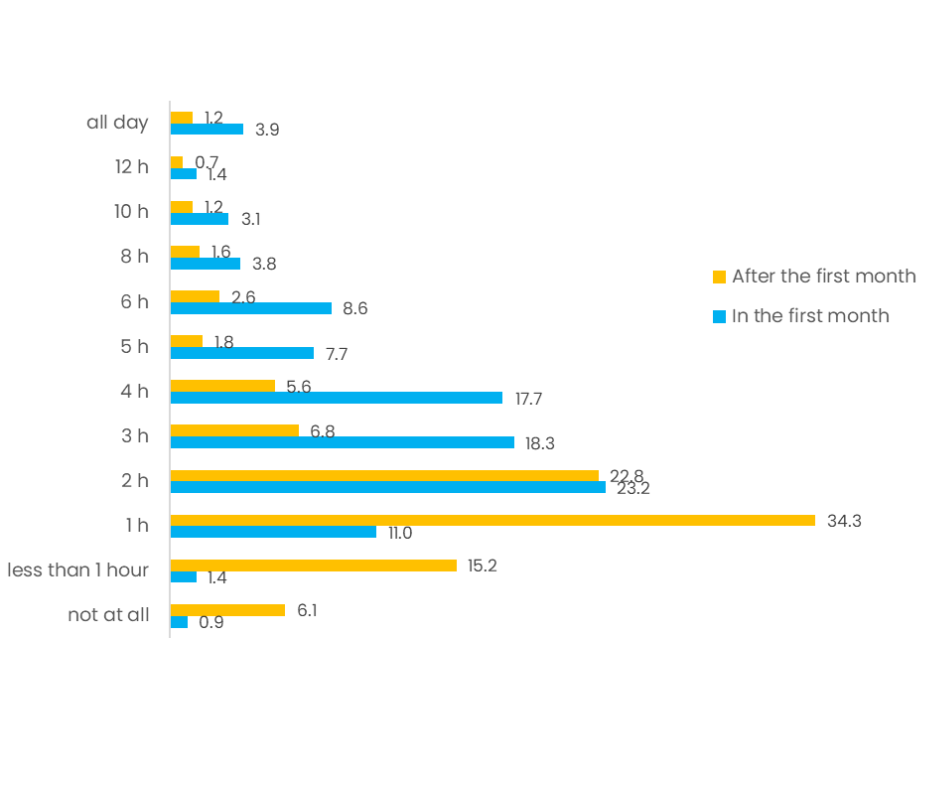“We are learning together” Yorkshire and Humber Homes for Ukraine Host Feedback Survey 2023: Quantitative Report
Contents
General Information About the Host Feedback Survey 2023
Section 1: About Your Situation
Section 2: Your Experience of Hosting
2.1 Before the Arrival of Your Guest
Background
In February 2022 Russia invaded Ukraine. The UK government along with other countries around Europe and the world responded quickly by opening up safe routes for Ukrainians who were forced to flee the country. In the UK, there are three visa routes open to Ukrainian refugees, depending on their circumstance. These are: Ukraine Extension Scheme, Ukraine Family Scheme, and Ukraine Sponsorship Scheme (Homes for Ukraine).
The Homes for Ukraine scheme enables UK households to sponsor (host) an individual or family. At the start of the scheme, hosts received a £350 'thank you' payment per month, this later increased to £500 per month once the Ukrainian guest has been in the UK for 12 months; this payment continues up to 36 months. The Home Office is responsible for issuing visas once checks have been completed. The scheme is managed by the Department for Leveling Up, Housing and Communities (DLUHC). Local Authorites (LAs) are paid a tariff to cover the costs of pre-arrival checks -including Disclosure and Barring Service (DBS), property check etc, and to provide integration services to the new arrivals. Ukrainian guests also receive a £200 one off payment on arrival.
Migration Yorkshire (MY) is a partnership of councils working across the whole of the Yorkshire and Humber region. We provide leadership and coordination, evidence, and practical assistance to organisations from all sectors at local, regional and national level. Since the beginning of the conflict in Ukraine, Migration Yorkshire has sought to bring Yorkshire and Humber local authorities together to find shared solutions, to identify the key issues and maintain regular liaison with central government departments. This survey was designed to gather insights into the hosting experience, in order to share feedback to local authorities and use the findings to improve the hosting experience in the future.
The report was written by Dr. Tetyana Hnatyuk (MY Community Researcher, Ukraine) with contributions from Julia Vidal (MY New Migrants Welcome Manager) and Dr. Vanja Celebicic (MY Policy and Research Officer).
General Information About the Host Feedback Survey 2023
The survey was anonymous and was open between 10 June and 10 July 2023.
There were 700 submitted responses, with representation from across the whole of Yorkshire and Humber. 59.8% of respondents were still hosting and 10.1% had hosted more than once.
The survey consists of three parts: questions on the participants’ hosting situation (Section 1), questions on the participants’ views on hosting including before and during the hosting process (Section 2) and questions on the future including participants’ plans to host again, their views on the possible improvements of the Ukrainian Scheme and the long-term consequences for their households and communities (Section 3). There were 28 questions, including questions with multiple choice, semi open-ended and open-ended questions.
Summary
The aim of this survey was to collect data and information from hosts across Yorkshire and Humber on the Homes for Ukraine Scheme, their experiences of hosting and ways to improve similar schemes in the future.
This report explored the quantitative findings of the survey; further analysis of the open questions will be explored in a follow up report.
In Part 1: About your situation, the majority of hosting began between April and June 2022. Of those who responded over half (66%) had been hosting for 6 months and longer. We identified reasons people were able to host:
- The majority of people (73%) were able to set up and offer to be hosts as they had additional space.
- A third of hosts were retired, and felt they had time to support although 23% were in some form of employment.
In Part 2: Your experience of hosting, we looked at before arrival and post arrival of guests. Before arrival:
- 74% reported that before their guest arrived the contact and information they had received from their local council (or representative) was enough in relation to their needs. The respondents mentioned that step-by-step guidance or a check list on practical things, admin and paperwork would have been useful for them.
After arrival:
- 64% of respondents found their contact with local councils to be adequate and 60% of the respondents reported that they had felt supported by their local council (or their representative).
- The main challenges for the hosts were language barriers (34%), amount of time and effort needed to support their guests (30%) and practical problems the guests faced (30%).
- In general, the majority of hosts spent up to 4 hours a day supporting their guests in the first month. Aside from their local authorities the findings show that more than half of hosts turned to other hosts (69%) or to local community groups (38%) for help or advice.
- 55% of respondents reported that they would not be able to host without the ‘thank you’ payment.
In Part 3: The future we asked if people would host again and what lessons could be learned from the experience.
- 38% of hosts would host again, compared to 23% who would not host again. Decisions not to re-host related to needing a break for themselves and their households.
- A further 20% would consider hosting again but only for a pre-agreed fixed period.
- More than half of the respondents (54%) indicated that they would like to receive an opportunity to share what they have learnt or to mentor new hosts; and a third of respondents (32%) would want a follow up check in from the council.
- Some participants suggested the need to develop a smoother and less traumatic process for both hosts and guests to complete hosting. Other respondents emphasised the need for further support for guests regarding their own accommodation and financial independence.
Please note all percentages in the summary are rounded.
Section 1: About Your Situation
This section was designed to gather brief information about people in order to establish if there were common threads that enabled people to host. We were curious to learn if there were patterns of hosting arrangements, what enabled people to host in a practical sense, or differences between host circumstances, such as access to services and transport.
The majority of the responses came from North Yorkshire, this is reflective of the number of Homes for Ukraine arrivals to that area (Annex. Chart A) Ukraine Sponsorship Scheme: Visa data by country, upper and lower tier local authority - GOV.UK (www.gov.uk)
We asked research participants what the main reasons were that enabled them to host, giving suggested options based on learning from our qualitative research with hosts (‘Everyday hosting’). Hosts’ reasons for feeling able to participate in the scheme were different and often in combination (Chart 1). The findings show that available space was the main reason. Most of the respondents (72.8%) had an additional spare room or self-contained guest space. Some respondents (22.5%) answered that their older children no longer lived primarily at home. Additionally, about a quarter of respondents who chose the option “Other” had rentable premises that they decided to offer to people from Ukraine.
At the same time, 31% of the survey participants said they were able to host because they were retired, whereas some said they were able to host because they were in full time (13.4%) or part time (9.8%) employment or not in paid employment (3.9%).
Some of the respondents (19.5%) chose “Other” as reason for being able to host. Out of these, nearly half (47.7%) indicated a humanitarian reason and a desire to help people from Ukraine fleeing the war; some (9.1%) said they were in friendly or family relations with the guest already before their arrival; and other of respondents (7.6%) stated they had personal or family experience of being a refugee, and therefore wanted to host. Some respondents (5.3%) felt they could help in terms of energy, time, or employment opportunities.
At first sight it might seem odd that some people said being in work enabled them to host, whilst others said not working enabled them to host, for example. This question helps us to recognise how hosting can be enabled for different reasons, according to each person’s individual circumstances and perceptions. We plan to unpack this question further in future analysis and include a more detailed look at which particular combinations of reasons led hosts to feel able to participate in the scheme.
Chart 1. Reasons why the participants felt able to host. The participants could choose multiple answers.

Section 2: Your Experience of Hosting
In this section we wanted to find out what hosts had done to prepare for their guests’ arrival and if these had been useful, this was to identify what preparations had the greatest impact. We aimed to identify the biggest challenges hosts faced, and how much time they had given to their guests.
We also wanted to learn if hosts had felt they had received enough information and support during hosting.
2.1. Before the Arrival of Your Guest
Almost three-quarters of respondents (74.4%) reported that before their guest arrived the contact and information they had received from their local council (or representative) was enough in relation to their needs. At the same time, a quarter of the respondents (25.6%) would have liked to receive more support (Annex. Chart H).
Some of the most common answers to the question “What else could have helped you as a host at this stage?” can be seen below:
- One of the most popular responses was related to clearer information on access to different services (such as Universal Credit, GP, dental care, banks, or school admission). The respondents mentioned that step-by-step guidance or a check list on practical things, admin and paperwork would have been useful for them.
- The hosts felt lost and overburdened at the beginning of the scheme and would have liked to get more attention from local authorities, for instance, easier ways of communicating (for example, alternatives to emails) or faster responses.
- Some hosts faced difficulties relating to DBS checks (for instance, they would have liked to receive a DBS check result before the arrival of a guest) and inspection of their accommodation. They would have preferred to be aware of the checking procedure in advance.
- The respondents would have liked to receive more information about Ukrainian culture in general, cultural differences and more information about their guests before their arrival.
- More contact with other hosts or creating host groups.
- Support in tracking the visa process of Ukrainian guests.
- Respondents also mentioned more financial assistance or payments in advance as they supported their guests financially at the beginning of their stay but received the first 'thank you' payment a few weeks after the guest’s arrival.
- A clear procedure for ending hosting.
The findings show that what helped respondents most to prepare for hosting was getting information (Chart 2). About a third of respondents turned to official channels for information: read guides about the Homes for Ukraine Scheme, visited the gov.uk website, and communicated with local councils. Another third said that they used social media (especially different Facebook groups) and local host groups to search for the necessary information. About 20% of respondents turned to non-governmental organizations for help (such as Sunflower Sisters, Sanctuary Foundation, Reset, Opora Platform, Reginald Centre Leeds, Horton Housing, Holme Valley, Refugee Charity and so on) and attended training for hosts offered by them. Almost every tenth respondent searched for information on their own on the internet, and about 3% of respondents communicated with potential guests to clarify bureaucratic issues.
Chart 2. The response of the participants to the question “What helped you most to prepare to be a host?” The participants could choose the one or two most useful things.

More than half of respondents said that what helped them prepare for hosting was making practical arrangements before their guests’ arrival. Most answers related to getting a house or a room ready and re-arranging space. Some hosts decorated a room for their guests, bought bedding, towels and furniture. About 20% of respondents tried to contact schools to arrange a place for their guest’s children in advance. About 13% of hosts wanted to arrange a visit to a GP or a bank for the guests before their arrival.
More than half of respondents said that during preparations for welcoming their guests what helped them most was talking to others. Most often this “other” included other hosts, as well as hosting family members, friends, neighbours, or other local people in the same situation. The respondents joined local host groups on social media as well. Some respondents said that they talked to different non-governmental organisations, charities or churches that also provided support. There were hosts who contacted local authorities or Ukrainian speaking acquaintances.
10.6% of respondents chose ”Other” as an answer to what helped them prepare for hosting. Some of them mentioned previous experience of hosting different groups of people (refugees, foreign students, au pairs); others had useful skills and knowledge due to their profession. There were respondents who were not the first hosts for their Ukrainian guests; therefore, the guests were aware of all the procedures and didn’t require any help. Few respondents said they did not do any preparation.
2.2. After Your Guest Arrived
According to the findings of the survey, in the first days after the arrival of the Ukrainian guests 64% of respondents found their contact with local councils to be adequate. Almost a third of respondents (24.1%) described this contact as limited and 11.5% didn’t have any contact with their local authority at all (Annex. Chart I).
Overall we wanted to capture hosts general perceptions about the level of support received, 60% of the respondents reported that they had felt supported by their local council (or their representative); a third of respondents (30.4%) experienced limited support and every tenth respondent didn’t have any support from their local authority (Annex. Chart J)
Three quarters of respondents (74.8%) said that they or their guests were offered information on how to contact someone from the Homes for Ukraine team for issues or emergencies (Chart 3). More than half of respondents received information on access to benefits for their guests (67%) and how to contact the council or other services (65.2%). At the same time, less than half of respondents were offered information about English classes. Less than a third of hosts said they were given information about public transport (29%) or job opportunities (25%). Among the other information which was provided, the respondents highlighted access to school, information on opening a bank account, free bus passes and UK SIM cards, information about clothing, food banks, and contacts for Ukrainian organisations.
Chart 3. The response of the participants to the question “Were you or your guest (s) offered information on the following?” The participants could choose multiple answers.

The main challenges for the hosts who participated in the survey were the language barrier (33.7%), the amount of time and effort needed to support their guests (28.9%), practical problems the guests faced (24.9%) and struggling of their guests to find their own accommodation (18.3%). Additional challenges the survey respondents faced were to do with adapting their personal routines to new realities (17.1%), differences in values, beliefs, and world views with their guests (11.6%) and personality differences (6.8%) (Chart 4). At the same time, 6.6% of all respondents highlighted that they had no challenges or issues with their guests.
The respondents who picked the option “Other challenges” (29.8%) wrote about inappropriate behaviour or attitude of their guests; lack of personal space in the house; limited opportunities for their guests to find a job or not actively seeking a job; issues with or lack of public transport that sometimes led to an additional burden on hosts when they were forced to give lifts to their guests; unexpected financial implications due to help for the guests and bill increases; emotional or psychological pressure due to guests’ trauma and the impact of mental health on hosts and guests; different parenting styles and a feeling they needed to provide babysitting for their guest’s children.
Chart 4. The response of the participants to the question “What are the main challenges you have faced as a host?” The participants could choose their two biggest challenges.

In general, the majority of hosts spent up to four hours a day supporting their guests in the first month. Subsequently, the number of hours was reduced by half and most hosts spent up to two hours a day helping guests. In fact, after the first month more than 30% of respondents spent 1 hour a day supporting their guests. The number of hosts who felt they spent no time supporting their guests increased noticeably: from 1% in the first month to 6% after the first month (Annex. Chart K).
The respondents were asked to indicate whom they had received support from apart from their local authority (Chart 5). The findings show that the majority of hosts turned to other hosts (68.6%) or to local community groups (38.1%) for help or advice. Almost a third of the respondents contacted other Ukrainian guests (22.1%) or charities (21.1%). 24.1% of respondents listed “Other” as one of their choices and elaborated that this included family, friends, and neighbours as important support resource for them.
Chart 5. The response of the participants to the question “Did you get support from any of the following?” The participants could choose multiple answers.

Answers to the question about the importance of the 'thank you' payment were divided approximately equally: 55% of respondents reported that they would not be able to host without it, and 45% of respondents considered the payment useful, but that they could host without it (Chart 6).
Chart 6. The response of the participants to the question “How important is the ‘thank you’ payment to you?”

Section 3: The Future
In the final section we wanted to know if people would host again. We additionally wanted hosts to share with us what could be used to support people on hosting schemes in the future.
The answers to the question “Would you host again?” showed that 37.6% of respondents said they would host again, while 23.3% said they would not. A quarter of respondents (24.9%) said they were not sure if they would host again, while 20% said they would consider fixed term hosting (with a pre-agreed length) (Chart 7).
Some respondents explained that the reason for their choice had to do with them or their family members needing a break; others mentioned responsibilities to their family; a group of the respondents said they could no longer participate in the program due to advanced age. Some hosts said they would want to know more about any new guests before arrival, would want clearly defined time period set for hosting; others were concerned they would not be able to have the same positive experience with another guest or their rural location would not be suitable for some guests.
Chart 7. The response of the participants to the question “Would you host again?” The participants could choose more than one option.

Answering the question “What would you, as a host, want to see after the end of hosting?”, more than half of the respondents (54.1%) indicated that they would like to receive an opportunity to share what they have learnt or to mentor new hosts; a third of respondents (31.6%) noted a follow up check in from the council; 16% of hosts mentioned access to wellbeing support for themselves and 14% would like to receive a follow up check in by an independent organisation (Chart 8).
Some participants who selected the option “Other” also pointed out the need to develop a smoother and less traumatic process for both hosts and guests to complete hosting. Other respondents emphasised the need for further support for guests regarding their own accommodation and financial independence.
Chart 8. The response of the participants to the question “Thinking about the end of hosting; what would you, as a host, want to see afterwards?” The participants could choose multiple answers.

Annex
The annex includes charts that were not presented in the text of the report in order to avoid text overload.
Chart A. The response of the participants according to the council area they live in.
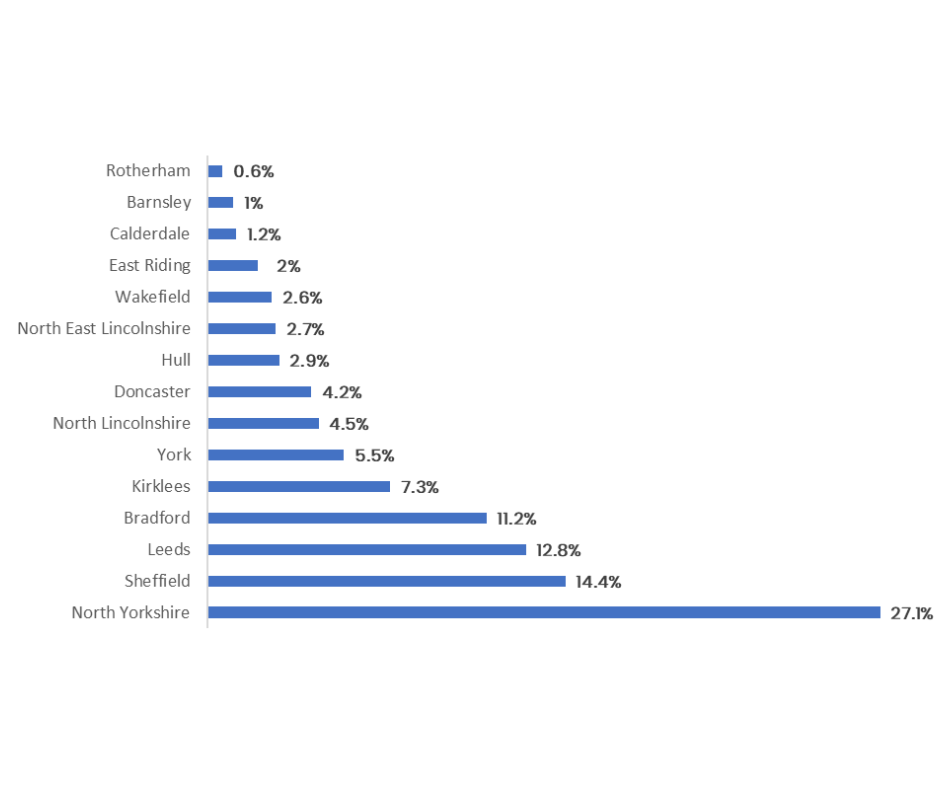
Chart B. When the participants first started hosting, month and year (%).
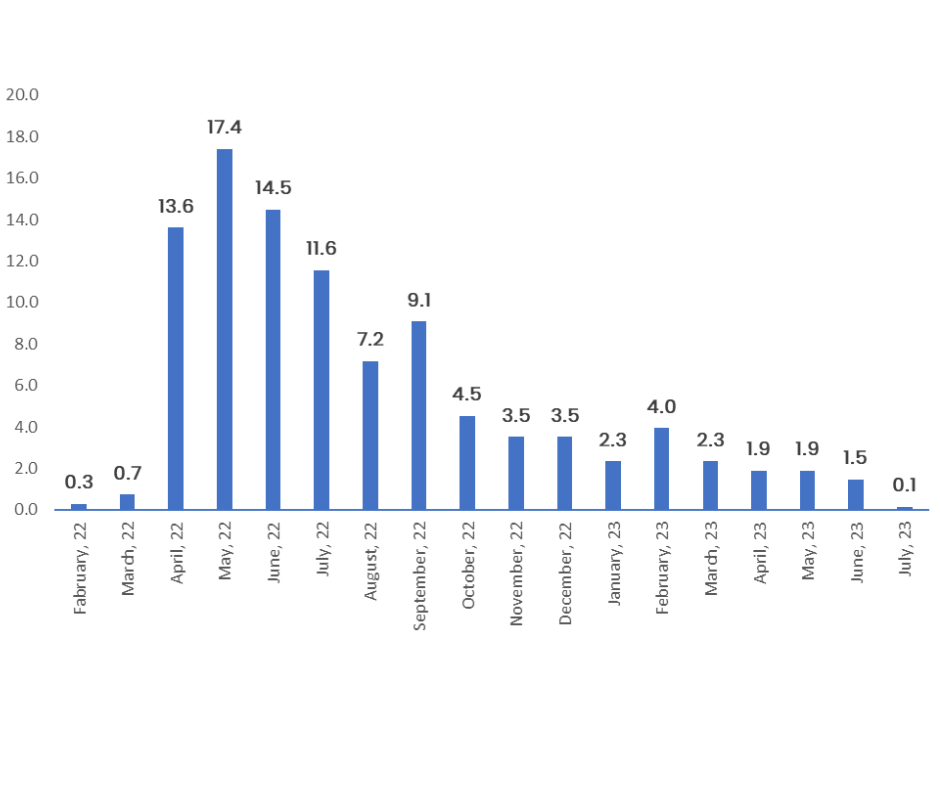
Chart C. The response of the participants to the question “Are you still hosting?”
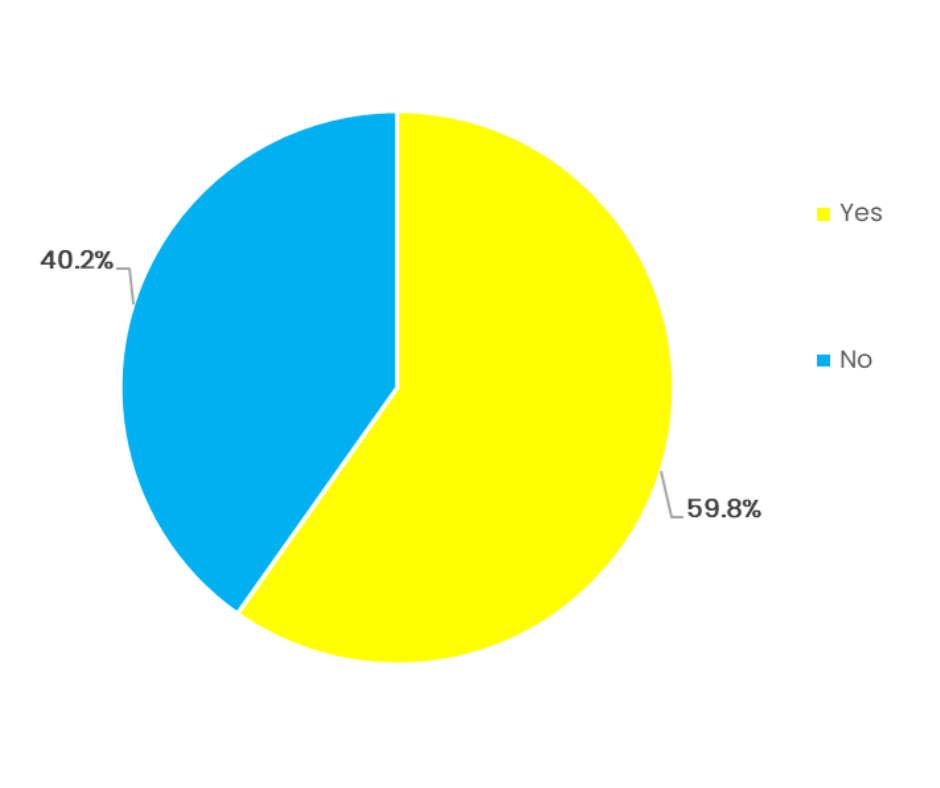
Chart D. The response of the participants to the question “Have you hosted more than once?”
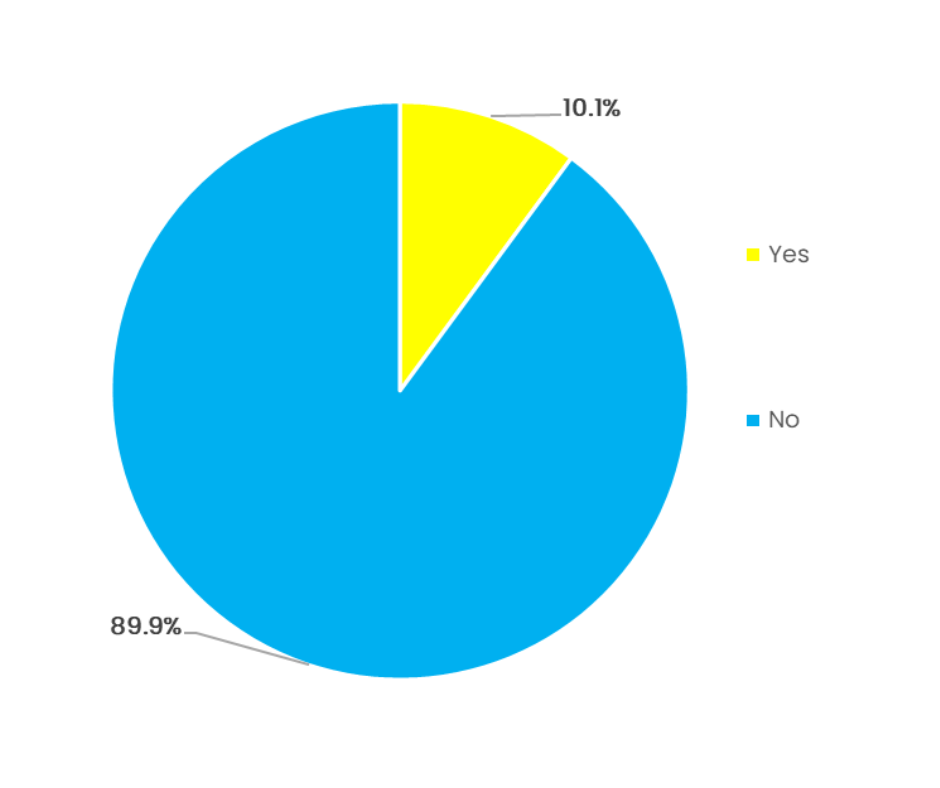
Chart E. The response of the participants who hosted more than once to the question “How long did the first hosting last?”
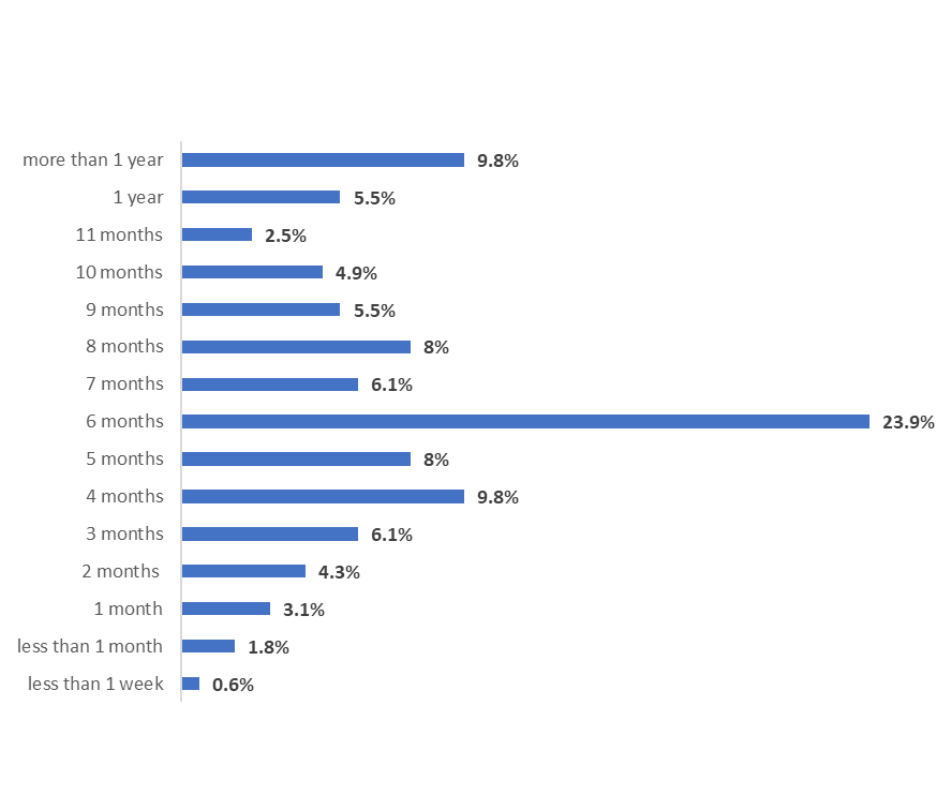
Chart F. The response of the participants to the question “How would you rate access to public transport for your guests?”
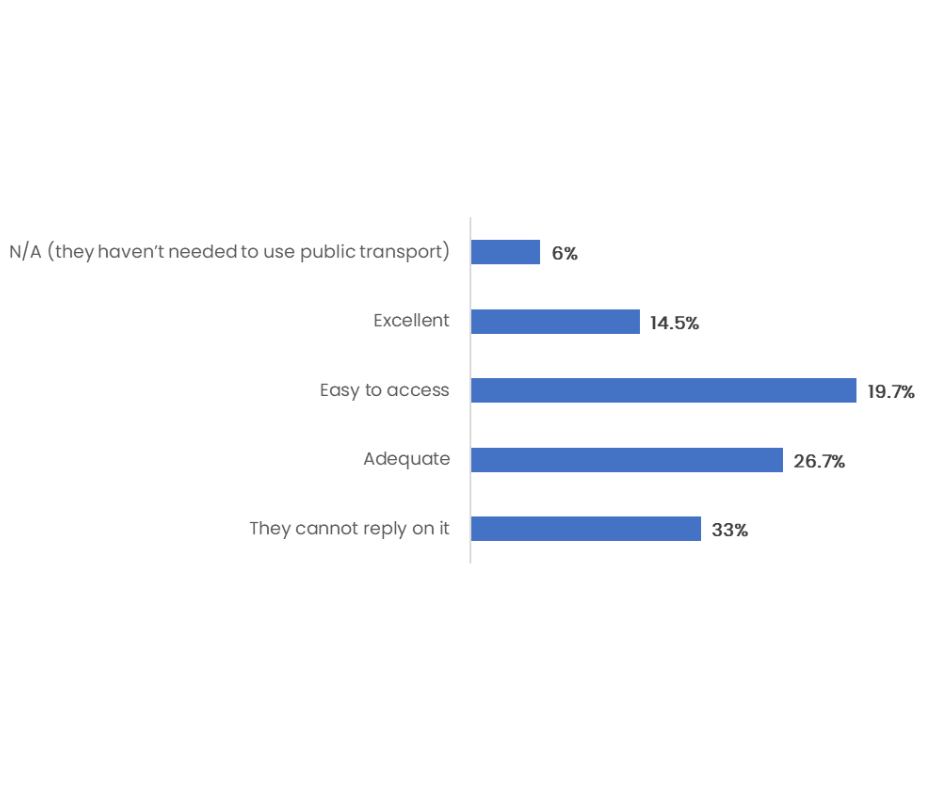 Chart G. The response of the participants to the question “How would you rate access to public facilities (for example Job Centre, shops, and doctors) for your guests?”
Chart G. The response of the participants to the question “How would you rate access to public facilities (for example Job Centre, shops, and doctors) for your guests?”
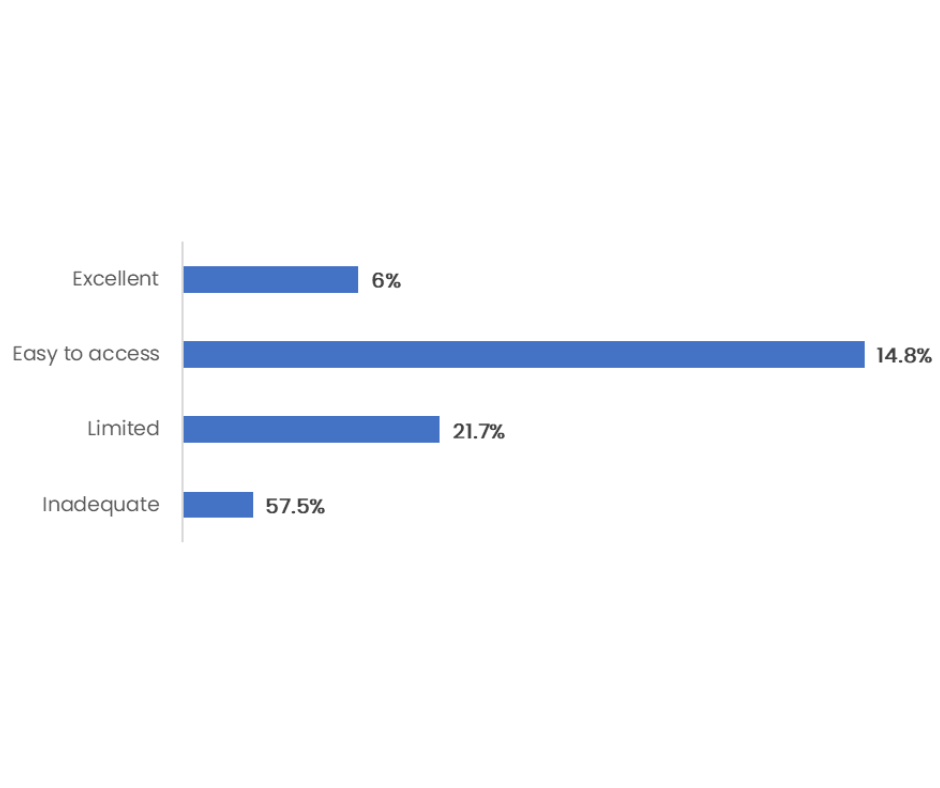
Chart H. The response of the participants to the question “Thinking about the contact and information you received from your local council, (or their representative), before your guest arrived was it enough in relation to your needs?”
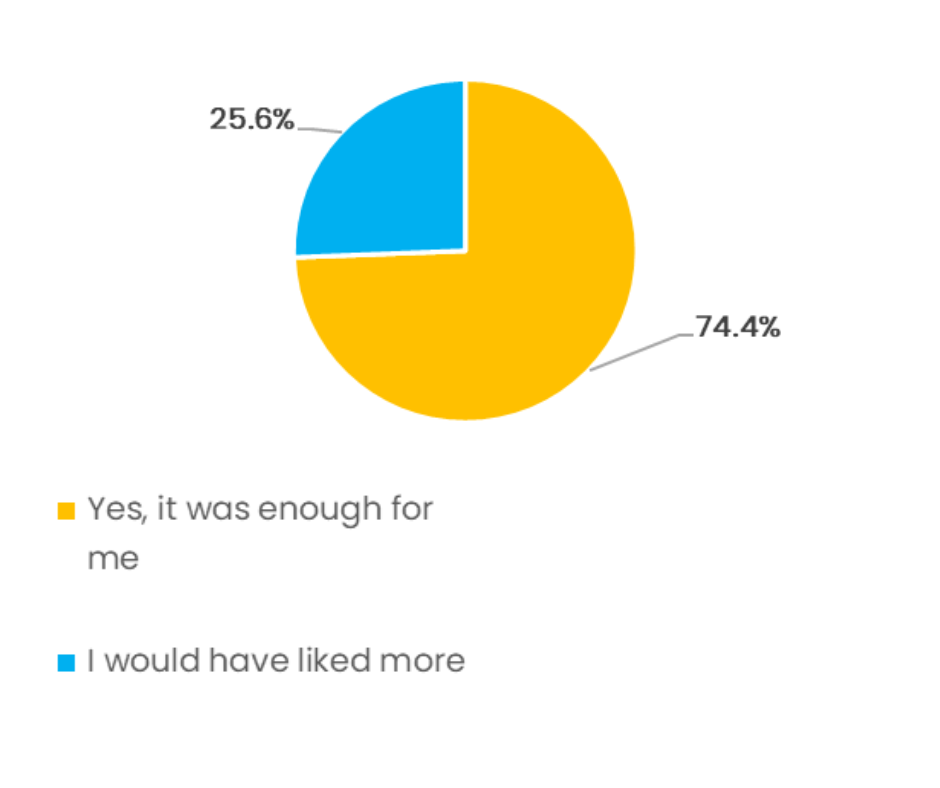
Chart I. The response of the participants to the question “In the first few days, how would you describe the contact with your local council (or their representative) when your guests arrived?”
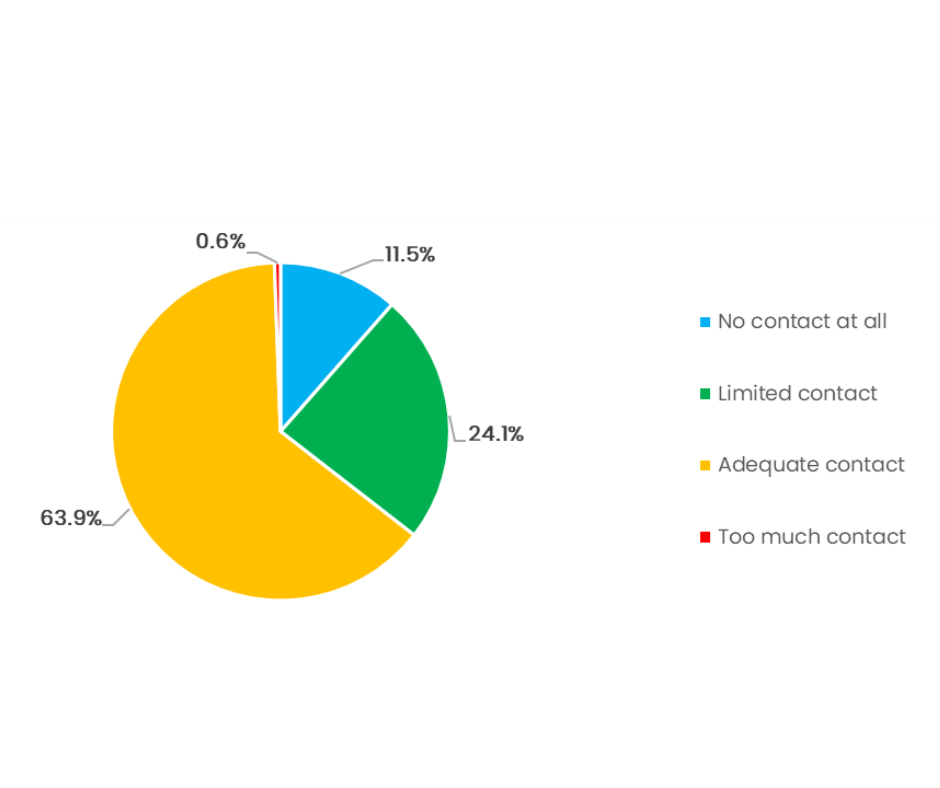
Chart J. The response of the participants to the question “Have you felt supported by your local council (or their representative)?”
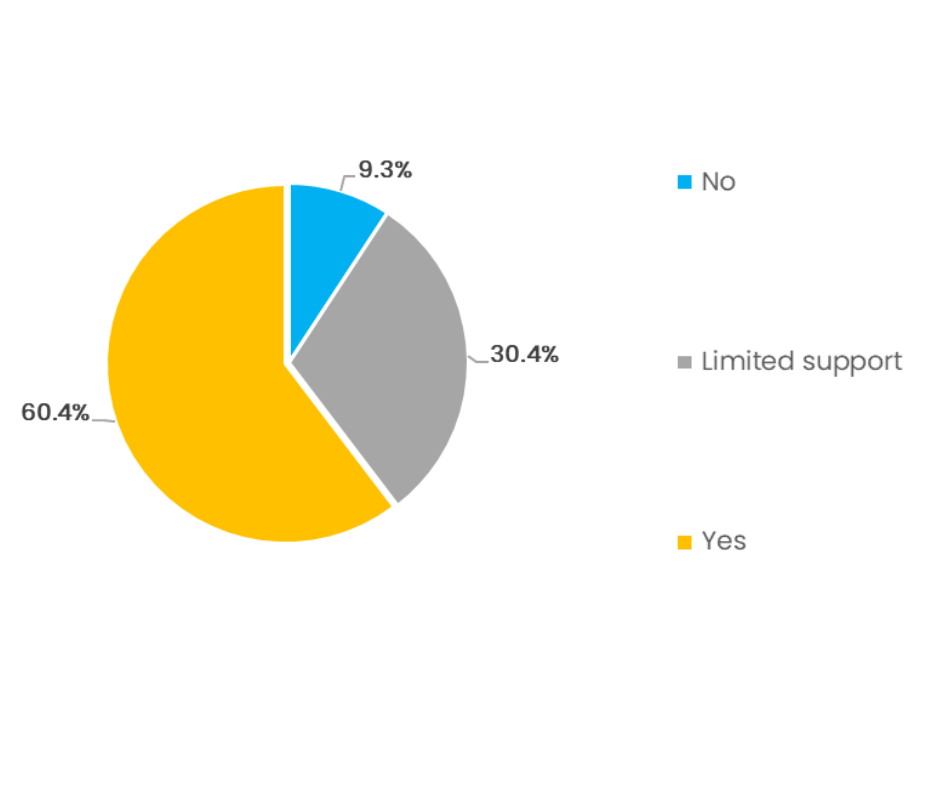
Chart K. The response of the participants to the question “On average how many hours a day did you spend supporting your guest? (In the first month and after the first month)” (%).
